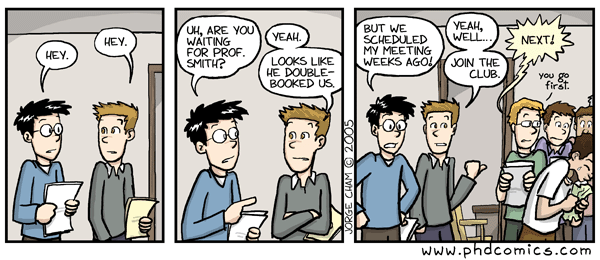Are you pulling your weight in the student-supervisor relationship?
 Hey folks, haven't heard from me in a while - sorry about that! Had a couple of crazy months but I'm back to posting...
Hey folks, haven't heard from me in a while - sorry about that! Had a couple of crazy months but I'm back to posting...
Here's an article from Nature in January that comes straight from the horse's mouth: my supervisor sent it around to our lab suggesting that we read it.
Read on for some excerpts I found interesting:
- Students often assume that once they call someone an adviser, he or she automatically acquires all the skills of advising.
- "You can’t assume that your adviser hosts productive meetings or can intuit what you need to know."
- So although it is natural to complain about your adviser — and can even be cathartic — it is not enough. If your adviser is not giving you what you need, you need to go out and get it.
- After all, if your adviser is the world leader in stem-cell technology, he or she must excel at the seem- ingly simple task of advising — not to mention possess highly developed interpersonal skills and a keen interest in graduate-student devel- opment. Sadly, that is not the case.
My take: I think many of us may assume that our supervisors have a vast collection of magical super powers, and they know exactly where we're struggling with and are already doing their best to support us. To bring it up with them would be akin to whining and complaining. No, I don't think that's the case! They don't see everything that we need them to, especially not things that we're not particularly proud of not knowing/understanding because those are the things we try to hide and cover up. This makes a lot of sense!
My take: Meetings with your supervisor with an agenda that YOU have set is crucial. I had a habit of doing this when I first started my project, but have gradually drifted away from it. I would send my supervisor an email with a bullet point list of questions/problems and proposed some solutions. It really helped me think about things more critically because I wanted to make sure I presented myself as intelligently and coherently as possible, and demonstrate that I had thought about the problem before coming to him. This made advising easy and relatively painless (for him). I've strayed from that unfortunately, likely because as my questions get more complex, it has gotten harder to write an email without having it turn into an essay. Anyway, I'll try and resume this because it guided my thinking. You should discuss with your supervisor what he thinks about this before you show up to his office with a list though!
My take: Can't agree with this enough! There's probably a very good reason why your supervisor isn't giving you what you need. This is a fixable problem! Go out and figure out how to ask for it... you're a graduate student, you need thick skin to get by. Strategies for getting what you want? Ask other students for advice, but don't forget to ask those that have perfect relationships with their supervisors and those that don't so you can get the right range of responses. Then, synthesize the advice you get and act on it. It's YOUR project and YOUR life. Take control.
And the upshot:
Care and Maintenance of your Advisor (Nature, 2011)
Read the article, and share your thoughts in the comments!
Cheers,
Firas
P.S. There was a post similar to getting the most out of your meetings with your supervisor by Samuel, I've linked to it here for further reading.